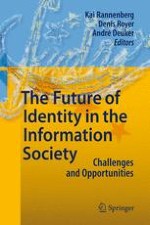
2009 | OriginalPaper | Buchkapitel
Introduction
verfasst von : Kai Rannenberg, Denis Royer, André Deuker
Erschienen in: The Future of Identity in the Information Society
Verlag: Springer Berlin Heidelberg
Aktivieren Sie unsere intelligente Suche, um passende Fachinhalte oder Patente zu finden.
Wählen Sie Textabschnitte aus um mit Künstlicher Intelligenz passenden Patente zu finden. powered by
Markieren Sie Textabschnitte, um KI-gestützt weitere passende Inhalte zu finden. powered by
The ever increasing digitisation of information has led to an Information Society, in which more and more information is available almost anywhere and anytime. The related digitisation of personal characteristics and personal information is progressively changing our ways of identifying persons and managing our relations with them especially in virtual interactions, e.g., over the Internet. As the Internet has opened new spaces for (virtual and supplementary) lives, supplementary digital identities, so-called virtual identities are being created for reasons of security, profit, convenience or even fun (e.g., for leisure communities). What used to be a ‘natural’ identity, e.g., the personal appearance of an individual at a counter, is now as virtual as a user account at a web portal, an email address, or a mobile phone number. These virtual and multiple identities and the paradigms behind them are feeding back into the ‘physical’ world, offering a mix of physical and virtual plural identities and processes to deal with them. Both the new artefacts as well as the new processes challenge the traditional definitions of identity. At the same time identities are subject to diverse forms of management in business, administration, and among citizens: There is almost no week, which does not see a new initiative aiming at ‘better’ identification of citizens, customers, consumers, or entities in general. In this context ‘better’ can have many different meanings, often depending from the point of view of the respective stakeholder: States and their administrations try to identify ‘their’ citizens, while citizens want to be able to influence the respective identification, e.g., its rationale, its degree, its process and last but not least the information flow around it, starting with the question whether or not identification is needed for a transaction or for participating in a certain element of life in society. The core question and often the source of conflict is who owns how much identity information of whom and who needs to place trust into which identity information to allow access to resources.